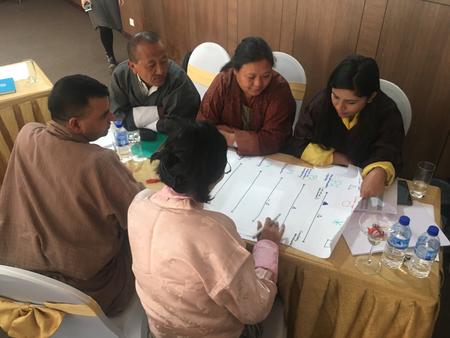How do human rights strengthen government systems for sustainable, equitable water, sanitation and hygiene access?

Access to water and sanitation are human rights, but does this status make any difference to how these essentials are provided in public services? Louisa Gosling looks at how our Making Rights Real approach is helping government officials tackle challenges to bringing water, sanitation and hygiene to everyone, everywhere.
The UN recognised access to water and sanitation as human rights in 2010, requiring application of the principles of equality, participation, accountability, sustainability and access to information on water and sanitation services.
But what value does it add to use a human rights approach to work on improving access to WASH (water, sanitation and hygiene)? In particular, what difference does it make to local government officials? These are the duty bearers on the front line; they have the most immediate responsibility to implement the rights to water and sanitation, and are most accessible to the rights-holders living in their area and to the civil society organisations who work with people to help them claim their rights.
We developed the Making Rights Real approach 2015, interviewing local government officials in 12 countries about their challenges and aspirations and what motivates them to try to reach everyone with WASH services. The result was a set of materials to help guide discussions between local government officials and civil society actors in a way that fosters more constructive collaboration to help achieve universal access.
Since then, we have used the materials in three countries, as part of wider programmes.
Systems strengthening in Ethiopia
We apply a systems strengthening approach, working in different ways to help government transform the enabling environment (the institutions, policies, infrastructure and resources around WASH services) to ensure services and behaviours are both inclusive and sustainable.
The Making Rights Real materials, translated into local languages, helped guide discussions with local government officials in regions that face severe capacity and resource constraints. They helped them reflect on challenges and understand their roles and responsibilities.
The officials discussed how they could benefit as individuals from adopting the human rights principles. They realised it could help them draw on others for support for capacity and resources; it could help improve local government responsiveness to people’s demands; and that that in turn would support them in problem solving to make best use of scarce resources.
Practising constitutional commitment in Burkina Faso
We are aiming to help put into practice the Government’s constitutional commitment to the realisation of the human rights to water and sanitation.
The programme is based on analysis of how the human rights are articulated in national legal and policy frameworks, the level of knowledge about the rights and the platforms and opportunities for engagement between government officials and people. It involves developing capacity of communities and authorities at different levels about human rights to water and sanitation and what this means in terms of roles and responsibilities.
Championing people with disabilities in India
We have supported the Swachh Bharat Mission in working towards reaching everyone in the country with sanitation, especially those in danger of being left behind.
In Orissa state we worked with civil society organisations that champion the rights of people with disabilities. The Making Rights Real materials helped to guide the discussion towards more collaborative problem solving. An evaluation of the intervention showed that the tool encouraged local government officers to recognise their responsibility to take disability into account in order to deliver services to everyone. They then went on to identify and mobilise existing resources that could be used to develop WASH services that everyone uses.
Unblocking WASH progress across the world
The materials were developed by a consortium of organisations including WASH United, UNICEF, End Water Poverty, Institute of Sustainable Futures – University of Technology Sydney (UTS-ISF) and Simavi. Together, we support organisations in using Making Rights Real, and work to continually improve the approach on the basis of experiences with implementation.
SIMAVI partners DORP are currently using the materials in Bangladesh, and ISF are supporting SNV to use the approach with government officials in Bhutan. In all these cases we are seeing signs that the conversations are helping to unlock some of the common blockages to WASH progress at the local government level.
We encourage others to use follow this approach, using the materials and guidelines available at making-rights-real.org
Louisa Gosling is Quality Programmes Manager at WaterAid UK @LouisaGosling1. She wrote this blog with inputs from Tseguereda Abraham, Landry Ouangre @landryouangre and Bikash Pati @BikashKPati of WaterAid, and Hannah Neumeyer of WASH United.




